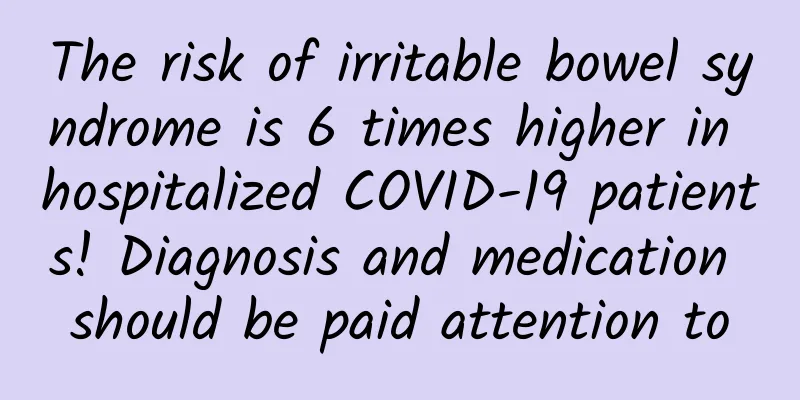The risk of irritable bowel syndrome is 6 times higher in hospitalized COVID-19 patients! Diagnosis and medication should be paid attention to

|
Recently, researchers from the University of Bologna in Italy published a research paper titled "Post COVID-19 irritable bowel syndrome" in the top journal of gastrointestinal diseases "Gut". The study showed that within one year of infection with the new coronavirus, hospitalized patients had a six-fold higher incidence of irritable bowel syndrome and a higher risk of depression compared with the control group. Irritable bowel syndrome Irritable bowel syndrome (IBS) has abdominal pain, bloating or discomfort as its main symptoms, which are related to defecation or accompanied by changes in bowel habits such as frequency and/or stool characteristics. Routine clinical examinations have not yet revealed any organic diseases that can explain these symptoms. Diagnosis of Irritable Bowel Syndrome Alternating diarrhea and constipation is a common manifestation of incomplete intestinal obstruction (colon cancer, diverticular disease) and irritable bowel syndrome. IBS is a functional disease, so diagnosis by exclusion is important. For high-risk groups or high-risk symptoms such as those aged > 40 years, with blood in the stool, positive fecal occult blood test, nocturnal bowel movements, anemia, abdominal mass, ascites, fever, unintentional weight loss, family history of colorectal cancer and IBD, it is recommended to complete auxiliary examinations such as colonoscopy to exclude organic diseases before making a diagnosis. At present, the IBS criteria commonly used in secondary medical institutions are the Rome IV criteria published in 2016, which state that symptoms must have occurred for at least 6 months before diagnosis and meet the following criteria in the past 3 months: recurrent abdominal pain, with an average of at least 1 day/week in the past 3 months, combined with 2 or more of the following: (1) Abdominal pain is related to defecation; (2) Attacks are accompanied by changes in bowel movement frequency; (3) Attacks are accompanied by changes in stool characteristics (appearance). The following symptoms are not required for diagnosis, but their presence supports the diagnosis of IBS: (1) Abnormal bowel movement frequency: less than 3 bowel movements per week or more than 3 bowel movements per day; (2) Abnormal bowel movement characteristics: lumpy/hard stools or mushy/watery stools; (3) Straining during bowel movements; (4) Feeling of urgency during bowel movements or a feeling of incomplete bowel movements; (5) Passage of mucus in the stool; (6) Abdominal distension. In addition, other digestive tract diseases (such as appendicitis, gallbladder disease, ulcers, and tumors) can induce IBS. If a patient has rare symptoms of IBS , further examination is required. IBS does not lead to malignancy or inflammatory bowel disease, nor does it shorten life expectancy. Dietary modification and non-drug treatments Treatment varies from person to person, but the basis of initial treatment is simple dietary modifications**** and non-drug treatments . If specific foods or certain types of stress trigger the condition, these foods and stress should be avoided as much as possible. For example, people with bloating and flatulence should avoid beans, cabbage, and other foods that are difficult to digest; avoid large amounts of foods, medications, and chewing gum with artificial sweeteners such as sorbitol, and eat fructose in small amounts. For people with IBS who present with constipation, regular physical activity can help restore and maintain normal gastrointestinal function. Appropriate medication can relieve symptoms IBS is a group of clinical syndromes characterized by abdominal pain. The main cause of abdominal pain is smooth muscle spasm, so spasmolytics such as pinaverium bromide, otilonium bromide, and alverine can relieve abdominal pain symptoms. Many international guidelines and consensus opinions recommend spasmolytics as the first-line medication for improving IBS abdominal pain symptoms, but some experts have suggested that spasmolytics may aggravate the constipation symptoms of IBS-C. In addition, many studies have shown that IBS patients have intestinal flora disorders, which may be related to the occurrence and development of IBS. In recent years, many randomized controlled trials have found that probiotics can relieve abdominal distension, abdominal pain, diarrhea and overall symptoms in IBS patients. For patients with diarrhea, antidiarrheal drugs can be selected appropriately according to their condition; for patients with constipation, mild laxatives and prokinetic drugs can be taken. In addition, psychological cognition and behavioral guidance are also necessary parts of IBS treatment. |
>>: Must-learn class: Five steps in daily care for coronary heart disease
Recommend
Come and see! An autobiography from a stomach cell…
Author: Lu Ting Shanghai Jiao Tong University Sch...
Women with this "taste" are destined to die early
Everyone has their own eating habits and preferre...
Chemical abortion stomach pain
Abdominal pain caused by biochemical abortion is ...
What vegetables can you eat while breastfeeding?
Breast milk is the best food for newborn babies. ...
Attention! The positive rate continues to rise, more than 99% are influenza A! Expert advice is here →
According to the latest data from the Chinese Cen...
What is the reference value of estradiol during pregnancy?
Nowadays, every family pays great attention to pr...
National Nutrition Week | Tips for healthy cooking
Healthy eating requires choosing the right ingred...
Can the fallopian tube become unobstructed after angiography?
Bilateral obstruction of the fallopian tubes is a...
What are the white spots on the nipples?
Breastfeeding is the most recommended way of feed...
How many years can you live with breast cancer in the middle stage?
What is terminal breast cancer? I think everyone ...
Uterine fibroids 4cm
The symptom of uterine fibroids can cause great h...
What to eat to stop bleeding during menstruation
Metrorrhagia is a common exudative gynecological ...
Does breast augmentation with implants affect breastfeeding?
Many women may feel dissatisfied with their breas...
What does proline aminopeptidase positive mean?
In daily life, many female friends have gynecolog...
There is a long white thread coming out of my eye. What is it?
Source: Dr. Curious The cover image and the images...









